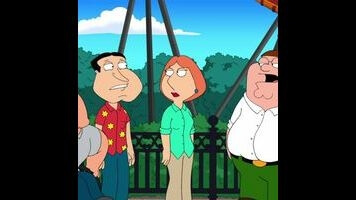For a show that’s pointedly unsophisticated, Family Guy has quite the obsession with time travel. Of course, the show trades heavily in references, so time travel provides infinite opportunities to point, with tongue firmly in cheek, to Lincoln’s assassination and the crash of the Hindenburg, two events that play a part in “Yug Ylimaf.” But there’s a deeper and perhaps more diabolical significance to the show’s investment with time machines. For a series marking its 200th episode, it looks back almost constantly as it crusades boldly into the future, with some mixture of nostalgia and desperation. In the last few years it’s been hard to shake the sense with any given episode of Family Guy that you’ve seen this all before.
Of course, “Yug Ylimaf”’s plot is no exception. Family Guy’s already done the meta-time-travel thing with last season’s “Back To The Pilot,” in which Stewie and Brian go back to (you guessed it) the first episode of Family Guy and, of course, create several alternate timelines that threaten to destroy the fabric of space-time. In “Yug Ylimaf,” the show doubles back on the time travel premise—not just going back to the beginning of the show, but going back… backward. In an homage to Ferris Bueller’s Day Off, Brian tries to dial back the “years traveled” odometer to hide his travels from Stewie and as a result reverses the flow of time. “What does that even mean?” Brian asks in anguish of Stewie (who is staring out the window in horror, having uttered the devastating pronouncement). Then Brian looks out the window, and watches as everyone walks, bikes, and drives backwards through the street and, presumably, their lives. “Oh,” he observes. “Now I get it.”
If a show must do a time travel episode—and it does seem, in Family Guy’s case, that it must—the backwards-running gag isn’t half bad. It provides a way for the most exhausted of Family Guy’s long-running inside jokes to seem, if only for a moment or two, slightly novel. I am not convinced that Peter’s rivalry with the Ernie The Giant Chicken was ever funny, but even if it was, watching it backwards is quite entertaining. Reversing the familiar beats of their brawl—devastation, then extended special-effects epic brawl, then epic brawl, then narrow-eyed recognition, ending in a fateful encounter—not only introduces a fresh hilarity to it, but it also takes apart the gag, exposing how silly and manufactured it is.
Stewie and Brian are easily the most fun pairing on Family Guy—the two most well-shaped characters, with the most comic potential and least likely friendship. Both characters have maintained a certain complexity, an ability to be both nice and mean, a capacity for both brilliance and stupidity. But they’re also the most tired pairing, unfortunately. The show has leaned on Stewie and Brian for comic potential for so long that their dynamic is clichéd. But they have to be the protagonists for this episode—they’re the only two characters sharp enough to maintain the self-reference necessary to hold up time reversal as meta-commentary on the show. For example, when Brian and Stewie are trying to plan how to reverse the time reversal (or whatever), Brian’s obscure reference comes after the expository cutaway, not before. It’s less comprehensible, yet funnier; Stewie sarcastically observes the reversed order, than gasps as he realizes the reverse time is affecting them, too. It’s a nice touch. But that type of clever joke, of course, takes something of a backseat to the requisite reverse-pooping and reverse-vomiting scenes that are depicted in overly specific detail.
The climax of the episode is when time starts going backward so quickly that Stewie is being rushed back into Lois’ womb, leaving Brian to save the day. Obviously, he does. The episode ends with Stewie being born—again!—and the family deciding to name him “Stewie” because Brian keeps calling him that. It’s a not-too-subtle metaphor for the show—a kind of expedient retcon, a reset of the timeline so that the whole show can start over. I doubt that the show’s timeline actually will start over. Rather, a plotline like this further cements for the viewer that Family Guy can do whatever it wants. There’s no character development anymore, and there never was any continuity. It’s as if the show itself is reborn with each episode, blithely delivering a new timeline with the same characters every week.
It works, I think, but in a limited way. When no one changes and there are no overarching storylines, the show has to build an entire reality in each episode, based only on the bare bones of what its premise (neatly framed in the opening credits) provides. The result is that Family Guy keeps delivering riffs on more of the same. It’s cold product. I’m not saying it wasn’t fun while it lasted, but I’m more or less over it. And if this episode is any indication, it’s beginning to seem like Family Guy is over itself, too.

 Keep scrolling for more great stories.
Keep scrolling for more great stories.
